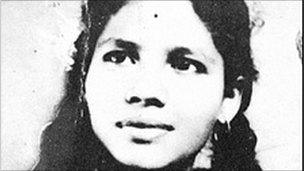India doctors to examine 'euthanasia' woman
- Published

Ms Shanbaug worked as a nurse in the hospital where she was attacked
India's Supreme Court has directed three doctors to examine the medical condition of a woman who has been in a vegetative state since 1973.
The court is hearing a plea to end the life of Aruna Shanbaug, a nurse in Mumbai who has been paralysed and considered "brain-dead" since she was attacked by a rapist in November 1973.
The plea has been made by a journalist who has written a book on Ms Shanbaug.
The court will examine if the plea is "akin to euthanasia".
It is being seen as a landmark case in India where euthanasia or mercy killing is illegal.
The court asked the doctors to submit a report on Ms Shanbaug's medical condition after examining her, and fixed 22 February as the next day of hearing.
Ms Shanbaug is force fed by nurses looking after her twice a day at the KEM hospital in Mumbai.
In her petition journalist Pinki Virani has said that Ms Shanbaug has been in a "persistent vegetative state" for 36 years and is "virtually a dead person".
Ms Virani wants the court to issue instructions to "forthwith ensure that no food is fed" to Ms Shanbaug.
But hospital authorities have told the court that Ms Shanbaug "accepts food in normal course and responds by facial expressions" and responds to "commands intermittently by making sounds".
Euthanasia debate
The Supreme Court said on Monday that "euthanasia is one of the most perplexing issues which the courts and legislatures all over the world are facing today".
"The court, in this case, is facing the same issue, and we like a ship in an unchartered sea, seeking some guidance by the light thrown by the legislation and judicial precedents in foreign countries", it said.
Ms Shanbaug was raped by a hospital sweeper at the KEM hospital on 27 November 1973. The sweeper tried to strangle her.
The petition says that she suffered "brain stem contusion injuries with associated cervical cord injury and due to this she was reduced to almost a vegetable".
Her attacker was sentenced to seven years in prison for attempting to murder and rob Ms Shanbaug.
This is not the first time that a mercy killing demand has gone to the courts.
In 2004, a terminally-ill Indian chess champion became a focus of a euthanasia debate before he died in a hospital.
Venkatesh, 25, was suffering from a genetic neurological disorder and was on life-support for more than seven months.
Both the hospital authorities and the Andhra Pradesh high court refused his request to turn off his life support system, saying that would amount to an illegal mercy killing.